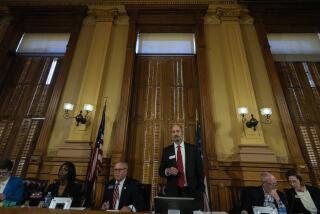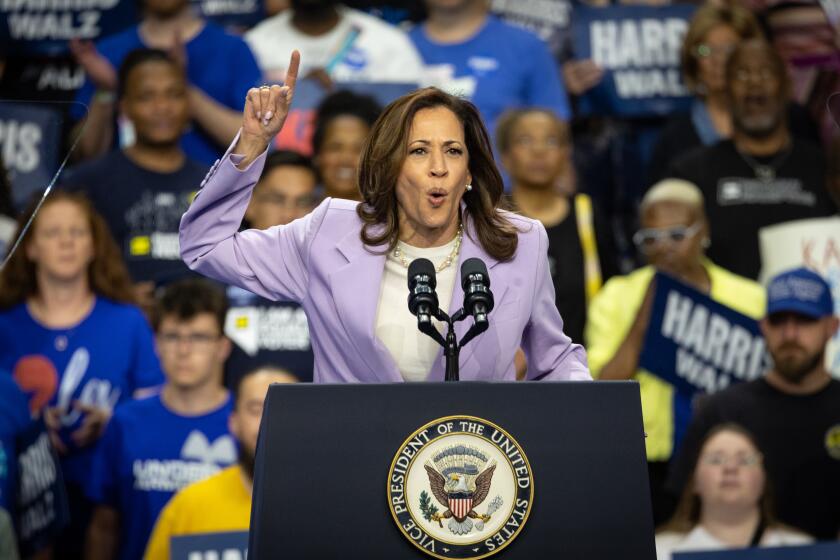Voters see some good in grim budget
The budget approved by Gov. Jerry Brown and lawmakers last month was largely distasteful to voters, a new poll shows, but many felt the process went more smoothly than in past years, when political paralysis gripped the Capitol and left the state starved for cash.
The element of the spending plan that most troubled Californians was the threat of steep cuts in education. In addition, about half opposed reductions made in healthcare and other services, and more than half viewed the budget as unfair.
But the poll suggested surprisingly strong support for higher vehicle fees and a new fire levy, both of which are included in the plan. Voters were about evenly divided on paying sales tax when buying from online retailers such as Amazon.com -- one of the budget’s most controversial provisions that now appears headed for a statewide referendum.
Voters were enthusiastic, though, about one development in Sacramento. More than 4 in 5 approved of state Controller John Chiang’s decision to dock legislators’ pay last month for failing, at first, to pass a balanced budget. About two-thirds endorsed the idea that the Legislature should become part time.
The survey, by The Times and USC Dornsife College of Letters, Arts and Sciences, polled 1,507 registered California voters July 6-17. It was conducted by Greenberg Quinlan Rosner Research, a Democratic firm, in conjunction with American Viewpoint, a Republican company. The margin of sampling error is plus or minus 2.52 percentage points.
Many of those polled seemed pleased to see a budget in place by the July 1 start of the fiscal year. A measure approved by voters in November allowed Democrats to send the plan to the governor on a simple majority vote, so no support from the minority Republicans was needed.
Nearly half of respondents, 44%, said the budget was done more easily this time. Only 14% said it went less smoothly.
Those answers, given despite the Capitol’s continuing bitter partisanship and failed negotiations on higher taxes, show how messy state government has become, said pollster Stan Greenberg of Greenberg Quinlan Rosner.
“Only in the context of California can you imagine coming out of that scenario and describe it as going more smoothly,” he said.
But after being told details of the spending plan, 55% of voters said it was unfair to people like them. Among Latinos, who experts say are already especially hard hit by the weak economy, 68% found the budget unfair. All voters expressed concern about the billions of dollars that would be cut from education and other areas if state revenue falls short of expectations; 64% found the possibility unacceptable.
Whites and Latinos differed on the tax increases built into the budget and on the cuts already made in healthcare, welfare, higher education and other services. Most whites said these were acceptable; most Latinos said they were not.
The new requirement that the state force Amazon.com and some other online retailers to begin collecting sales tax from California customers was opposed by 51% of those polled. Forty-five percent supported the measure, which has sparked national debate.
Opposition dropped slightly, for an essentially split verdict of 49% in favor versus 46% against, when voters were informed that the state loses hundreds of millions of dollars a year with Amazon’s and others’ failure to collect the taxes.
More than 80% of respondents said they do little or no online buying, but even those who do none are almost evenly divided on the new law. Perhaps predictably, support for the measure was weakest among the small group who do all or most of their shopping online. Fewer than one in three of those voters favored the tax collections.
“It just seems like they want to tax everything,” said Jonathan Dotson, a 28-year-old Democrat in the Bay Area community of Castro Valley who works in a pathology lab drawing blood. He complained that Sacramento should live within its means.
“Whoever is making decisions is just saying, ‘Tax this and make money, tax that and make money.’ They are always looking for more ways to make more money instead of just saying: ‘This is what we have and let’s work with it.’ ”
Others said there is no reason Amazon should be exempt from the rules that apply to other businesses.
“It’s unfair for owners of brick-and-mortar retail stores,” said Dorene Horzath, 51, a computer programmer in San Diego who is registered as a Republican. “The Borders right here next to where I live closed today. It bothers me. In order to get books I now have to go online. I can’t even go into an establishment anymore.”
Voters are more receptive to officials’ other efforts to boost revenue. A majority, 53%, found acceptable two new costs embedded in the budget: a $12 annual increase in vehicle registration charges and a $150 yearly fee assessed on homeowners in wildfire-prone areas covered by state firefighters.
Voters were split, however, on a $4-billion windfall projected for state coffers. The threatened $1.5 billion in cuts to education and more to other services would be triggered if the money does not arrive. Forty-one percent said lawmakers should have assumed the extra income, while 44% disagreed.
“Gov. Brown and the state Legislature need to hope their gamble on unanticipated revenue comes through, because voters are strongly opposed to the additional cuts that would have to be made if the money does not materialize,” said Linda DiVall, the American Viewpoint pollster.
There was a slight improvement in Californians’ rating of their Legislature, but approval is still paltry at 25%, compared with 21% in April.
Voters seemed eager to punish lawmakers, applauding the pay cut the state controller imposed when legislators failed to meet their June 15 deadline for balancing the budget -- power voters handed him when they lowered the vote threshold for passing spending plans.
Asked if they agreed with the move to dock lawmakers’ pay, 83% said yes.
“They are screwing around and not doing what they were elected to do, so give them an incentive, which is no pay,” said Sharon Coons. The 51-year-old Democrat, who lives in Vacaville, has been unemployed for five years and is studying for a degree in healthcare administration.
A strong majority of voters, 65%, would like to reduce California’s Legislature to part-time status -- a proposal that rears its head periodically -- with a commensurate reduction in pay.
“We have become a society where being a politician is a career,” said Arthur Lawler, 57, a Republican in the San Diego County community of Spring Valley who is an aviation inspector for the federal government.
“When this country started,” he said, “our politicians were businessmen who went to the state Capitol to do the work for which they were elected and then went back and ran businesses. It wasn’t a full-time job then. It shouldn’t be now.”
Nearly half of respondents, 48%, approve of the job Brown is doing. That is 4 points higher than in April -- and comes despite the state’s ongoing fiscal crisis and the governor’s inability to move key parts of his agenda forward.
“I feel like we haven’t seen what he is capable of yet,” said Valan DeBenedetti, 21, a student at American River College in Sacramento and a registered Democrat.
“With the economy and everything else, he hasn’t had time to show his true colors,” DeBenedetti said. “But I think he will do a good job.”
More to Read
Get the L.A. Times Politics newsletter
Deeply reported insights into legislation, politics and policy from Sacramento, Washington and beyond. In your inbox three times per week.
You may occasionally receive promotional content from the Los Angeles Times.











